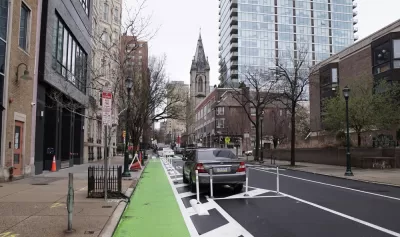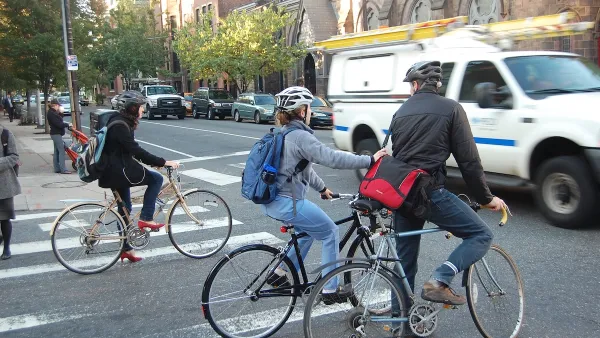The city is nearing its 2015 goal of building 30 miles of protected bikeways.

Philadelphia is close to reaching its goal of building 30 miles of protected bikeways, including separated lanes, raised cycle-tracks, and shared-use bike and pedestrian paths.
The city added close to 10 miles of new bike lanes in 2022, according to John Boyle of the Bicycle Coalition of Greater Philadelphia as part of its ‘High-Quality Bike Network.’ “The City is also working to mitigate the extreme scofflaw parking on the new two-way bike lane on Grays Avenue approaching Bartrams Garden.”
As Boyle points out, “The creation of a High-Quality Bike Network is only the start. The next mayor and council will have to ensure that maintenance for these facilities is adequately funded,” adding that “Sidepaths in particular can eventually fall into disrepair since the responsibility currently falls on the shoulders of the adjacent landowners who may or may see the path as an asset.” During winter, the city clears bike lanes only after secondary and tertiary roads have been cleared, Boyle notes.
FULL STORY: 2022 – The Year Philly Closed in on 30 Miles of Protected Bike Lanes

Planetizen Federal Action Tracker
A weekly monitor of how Trump’s orders and actions are impacting planners and planning in America.

Maui's Vacation Rental Debate Turns Ugly
Verbal attacks, misinformation campaigns and fistfights plague a high-stakes debate to convert thousands of vacation rentals into long-term housing.

San Francisco Suspends Traffic Calming Amidst Record Deaths
Citing “a challenging fiscal landscape,” the city will cease the program on the heels of 42 traffic deaths, including 24 pedestrians.

Amtrak Rolls Out New Orleans to Alabama “Mardi Gras” Train
The new service will operate morning and evening departures between Mobile and New Orleans.

The Subversive Car-Free Guide to Trump's Great American Road Trip
Car-free ways to access Chicagoland’s best tourist attractions.

San Antonio and Austin are Fusing Into one Massive Megaregion
The region spanning the two central Texas cities is growing fast, posing challenges for local infrastructure and water supplies.
Urban Design for Planners 1: Software Tools
This six-course series explores essential urban design concepts using open source software and equips planners with the tools they need to participate fully in the urban design process.
Planning for Universal Design
Learn the tools for implementing Universal Design in planning regulations.
Heyer Gruel & Associates PA
JM Goldson LLC
Custer County Colorado
City of Camden Redevelopment Agency
City of Astoria
Transportation Research & Education Center (TREC) at Portland State University
Jefferson Parish Government
Camden Redevelopment Agency
City of Claremont





























